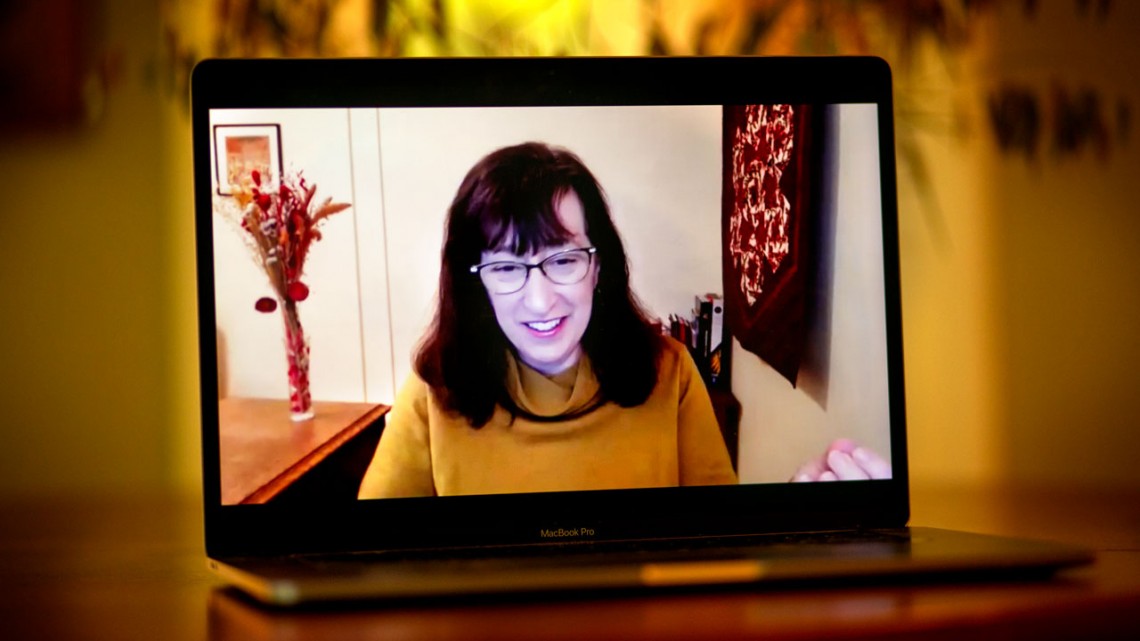
President Martha E. Pollack delivers her fourth annual address to staff via Zoom.
Pollack thanks staff for work in unprecedented circumstances
By Krishna Ramanujan
Despite the challenges of the pandemic, the Cornell community continues to pursue its mission and to thrive, President Martha E. Pollack said Oct. 20 in her fourth annual address to staff.
“You – Cornell’s staff – in so many ways are the backbone of this community,” Pollack said in the talk, delivered virtually from her home office. “And all of you, whatever your role, have done exceptional work in circumstances none of us trained for or even imagined.” After expressing her appreciation for Cornell’s staff and community, Pollack shared thoughts on what gave her hope for the future, gave an update on university priorities, and fielded questions from some of the nearly 2,000 community participants.
Pollack mentioned a few of the ways that staff members’ work has changed as a result of the pandemic : athletic coaches now serve as Behavioral Compact monitors, Statler Hotel employees are now running a quarantine center, and staff from across campus teamed up to develop a successful Cornell COVID-19 Testing Laboratory and surveillance testing program. “You’ve supported Cornell, and you’ve supported each other, through one of the most turbulent years in the history of this university.”
In Pollack’s update on the university’s four priorities, she emphasized that the Cornell community has not merely coped, but excelled, throughout the pandemic.
In the first priority, academic distinction, Pollack noted major prizes and awards won by faculty this year, including the American Philosophical Association Book Prize; the Jonathan Skytte Prize (equivalent of the Nobel Prize in political science); the Carl Sagan Medal of the Division of Planetary Sciences of the American Astronomical Society; a prestigious Humboldt Research Award; nine National Institutes of Health early career awards; and an Emmy nomination.
She also shared the work of Weill Cornell Medicine faculty who are trying to solve the puzzle of why the coronavirus can be asymptomatic for some people and lethal for others; and of researchers on the Ithaca campus who are compiling a review of evidence of coronavirus transmission via breastfeeding that will inform World Health Organization recommendations.
Efforts related to the second priority, educational verve, have been as spirited as ever, Pollack said.
“We’ve seen incredible teaching innovations, from using shoelaces and phone chargers to enable remote physics labs, to moving entire classes outdoors,” she said.
Staff have supported “new normal” teaching practices by keeping classrooms clean and ventilated, supporting the Center for Teaching Innovation, and facilitating a smooth transition to remote instruction.
Civic responsibility, the third priority, is vitally important, she said.
“If we have ever had a moment in our history where we have been face to face with our common responsibility for our shared future, it’s now,” Pollack said.
In light of the escalating impact of climate change, Cornell’s goal of carbon neutrality is increasingly urgent, Pollack said. In May, the Cornell Board of Trustees voted for an immediate moratorium on new private fossil fuel investments while growing investments in alternative fuel technologies. Among other sustainability highlights: A $7.2 million U.S. Department of Energy grant to Cornell will fund exploratory research on the feasibility of using geothermal energy to heat campus buildings; and in June, the Association for the Advancement of Sustainability in Higher Education awarded Cornell its highest sustainability rating, STARS platinum.
“We are the first Ivy League university, and only the sixth university in the world, to achieve this status,” she said.
On the social justice front, in light of recent killings of Black Americans and the nationwide response that followed, she said, Cornell has strengthened community involvement in public safety; held community conversations on race and racism; supported projects that enhance a welcoming Cornell community; and developed a staff training course, Advancing Diversity and Equity at Cornell.
She also mentioned her recent announcement to name two of the new North Campus Residential Expansion halls after late Supreme Court Justice Ruth Bader Ginsburg ’54 and late Pulitzer Prize-winning author Toni Morrison, M.A. ’55.
Regarding her fourth priority, One Cornell, Pollack thanked the community for the way it has come together despite so many challenges, including the financial impact of the pandemic. The high costs of transforming and reactivating campus have been compounded, she said, by lost income from hotel units and the Campus-to-Campus bus, and lost tuition and reduced housing and dining income—all of which have been dwarfed by the enormously increased need for student financial aid. In response to a staff question, she reaffirmed the administration’s commitment to reexamine the temporary cuts to pay and benefits instituted in response to the budgetary challenges..
“As difficult a year as this has been for all of us, I have truly never been as proud as I am right now to be a Cornellian,” Pollack said.
Prior to the address, the Employee Assembly (EA) announced the winner of this year’s EA Appreciation Award, the Building Care Team at Facilities and Campus Services. Brian Goodell, chair of the EA benefits and policy committee, presented the award to Robert Pils, director of Building Care, for his team’s dedication and commitment to providing necessary services to ensure the safety of those who remained on campus.
Other nominees included: Campus Life Enterprise Services; the Cornell COVID-19 Testing Laboratory; the Cornell Learning Technologies Team; Cornell University Library Desktop Services; and the ILR School’s Work and the Coronavirus.
Media Contact
Get Cornell news delivered right to your inbox.
Subscribe
